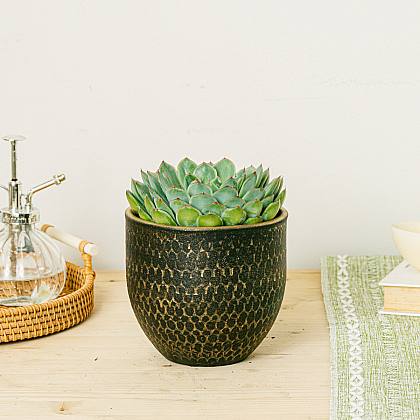Learn how to protect your home from non-ionizing radiation with these plants
The importance of taking care of our health at home is essential to maintain a safe and risk-free environment. In this sense, non-ionizing radiation is a factor that we must take into account, as it can affect us in different ways
The importance of taking care of our health at home is essential to maintain a safe and risk-free environment. In this sense, non-ionizing radiation is a factor that we must take into account, as it can affect us in different ways. But what exactly is non-ionizing radiation and how does it affect us? In this article, we'll explore this topic and discover how some plants can act as a natural shield against this radiation. These include Aloe Vera, Sansevieria Trifasciata, Ficus Benjamina, and Peace Lily, each with its own characteristics and benefits. Join us on this journey through the world of protective plants and discover how to protect your home from non-ionizing radiation.
The importance of taking care of our health at home
Taking care of our health at home is essential to have a good quality of life. We spend most of our time at home, so it's important that it's a safe and healthy place. In this sense, it is necessary to pay attention to the different factors that can affect our health at home, such as non-ionizing radiation. In addition, we must take into account other aspects such as air quality, humidity and cleanliness. Exposure to toxic substances and pollutants can cause respiratory problems, allergies, and chronic diseases. For this reason, it is important to maintain good ventilation in the home, avoid harsh chemicals, and maintain proper cleanliness. It is also important to control the humidity in the home to prevent the proliferation of mold and mildew, which can negatively affect our health. In conclusion, taking care of our health at home involves paying attention to different aspects such as non-ionizing radiation, air quality, humidity and cleanliness. By taking preventative measures and adopting healthy habits, we can ensure a safe and healthy home for ourselves and our family.
What is non-ionizing radiation and how does it affect us?
Non-ionizing radiation is a form of electromagnetic energy that does not have enough energy to ionize atoms or molecules. Common examples of non-ionizing radiation are radio waves, electromagnetic fields generated by electrical and electronic equipment, visible light, and infrared rays. Although this form of radiation is not as dangerous as ionizing, which can cause cell damage and genetic mutations, it can still affect our health if we are exposed to high levels and for long periods of time. Symptoms of exposure to non-ionizing radiation can include fatigue, headaches, insomnia, and trouble concentrating. In addition, some studies have suggested that exposure to non-ionizing radiation may be linked to an increased risk of cancer, although scientific evidence is limited and controversial. To minimize the negative effects of non-ionizing radiation in our home, it is important to limit our exposure as much as possible and take steps to protect ourselves, such as using electromagnetic radiation protection devices and having air purifying plants in our home. By understanding what non-ionizing radiation is and how it affects us, we can take steps to protect our health and well-being at home.
Plants as a natural shield against non-ionizing radiation
There are many ways to protect our home from non-ionizing radiation, and one of them is through the use of plants. Plants are a very effective natural tool for absorbing electromagnetic waves emitted by the electronic devices we use at home. Some of these plants have purifying and oxygenating properties that can help reduce the presence of volatile organic compounds (VOCs) in the air, which in turn improves indoor air quality.
Among the most effective plants to protect our home from non-ionizing radiation are Sansevieria Trifasciata, also known as "Mother-in-Law's Tongue", which is capable of absorbing large amounts of carbon dioxide and other harmful gases; Ficus Benjamina, a very versatile plant that helps reduce formaldehyde levels in the air; and Peace Lily, which in addition to absorbing non-ionizing radiation, also helps reduce VOC levels in the air.
It's important to note that while plants can be a natural shield against non-ionizing radiation, they are not a complete solution. Additional steps need to be taken to protect our health, such as limiting the time we spend exposed to electronic devices and keeping them away from our rest area. However, incorporating these plants into our home can be an effective and natural way to reduce our exposure to non-ionizing radiation and improve indoor air quality.
The Purifying Power of Aloe Vera
The Purifying Power of Aloe Vera
Aloe Vera is a plant known for its many medicinal and healing properties, but it also possesses a purifying power that makes it an effective ally against non-ionizing radiation. This succulent plant contains a jelly-like substance inside, which acts as a kind of natural filter by absorbing toxins present in the environment. In addition, aloe vera is able to neutralize volatile chemical compounds that can be released by electronic products, such as computers and televisions.
Thanks to its detoxifying properties, Aloe Vera can help reduce the negative effects of non-ionizing radiation in our home. By placing this plant near electronic devices, such as Wi-Fi routers or mobile phones, you can help minimize exposure to the electromagnetic fields they emit. In addition, Aloe Vera releases oxygen during the night, which helps to improve air quality and eliminate potential pollutants present in the air.
In addition to its purifying function, Aloe Vera is also known for its regenerating and healing properties. Its gel can be used to treat sunburn, wounds or skin irritations. In this way, it not only protects our home from non-ionizing radiation, but also provides benefits for our health and well-being.
In short, Aloe Vera is a versatile and protective plant that not only beautifies our indoor spaces, but also helps protect us from the negative effects of non-ionizing radiation. Its purifying capacity and healing properties make Aloe Vera an ideal option for maintaining a healthy environment in our home.
The Efficacy of Sansevieria Trifasciata in Absorbing Radiation
Sansevieria Trifasciata, also known as mother-in-law's tongue, is a plant that has been shown to be highly effective in absorbing non-ionizing radiation. This plant is native to Africa and is characterized by its long, pointed leaves, which grow in the shape of a rosette. Scientific studies have shown that Sansevieria Trifasciata has the ability to absorb and filter electromagnetic radiation emitted by electronic devices such as mobile phones, Wi-Fi routers and televisions, among others. In addition, this plant is also able to remove other toxins present in the air, such as formaldehyde and benzene. This makes it an ideal choice for protecting our home from the harmful effects of non-ionizing radiation. Sansevieria Trifasciata is an easy-care plant that requires little light and moderate watering. It can be placed in any room of the house, but it is especially recommended near electronic devices to maximize their effectiveness in absorbing radiation. In addition to its health benefits, this plant also adds a decorative touch to any space with its green leaves and unique patterns. In short, Sansevieria Trifasciata is a versatile and protective plant that not only beautifies our home, but also helps protect us from non-ionizing radiation.
The Ficus Benjamina: A Versatile and Protective Plant
The Ficus Benjamina, also known as the rain tree or the fiddle plant, is a versatile and protective species that can help maintain a healthy environment in our home. This plant is capable of absorbing a large amount of toxic gases such as formaldehyde, benzene and trichloroethylene, which are emitted by common chemicals in our homes such as paints, varnishes, detergents and plastics. In addition, Ficus Benjamina is also effective at absorbing non-ionizing radiation from electronic devices such as televisions, computers, and mobile phones.
This plant is easy to care for and can be grown both indoors and outdoors. It is important to place it in a place with good lighting but no direct exposure to the sun, as this can burn its leaves. Watering should be moderate and the soil should always be moist but not soggy.
In addition to its purifying and protective benefits, Ficus Benjamina is also valued for its aesthetics. Its glossy leaves and slender trunk make it a great choice for decorating any space in the home.
In conclusion, if you are looking for a plant that will help protect your home from toxic substances and non-ionizing radiation, as well as bring beauty to your environment, Ficus Benjamina is an excellent option. With a little care and attention, this plant can bring peace of mind and well-being to your home.
The Peace Lily Provides in the Face of Radiation
The Peace Lily, also known as Spathiphyllum, is a plant renowned for its beauty and air-purifying properties. However, it is also an excellent option to protect our home from non-ionizing radiation. This plant has the ability to absorb and filter the electromagnetic waves emitted by electronic devices, such as mobile phones, routers or microwaves. In addition, the Peace Lily has the ability to neutralize the negative effects of radiation, creating a healthier and calmer environment in our home.
This plant acts as a natural shield against non-ionizing radiation by absorbing charged particles and converting them into positive energy. By having the Peace Lily in our homes, we can enjoy a safer and more protected environment from the possible harmful effects of radiation. In addition, their presence gives us a sense of tranquility and peace of mind, which is especially important in an increasingly technological world.
To maximize the benefits of Peace Lily in radiation protection, it is recommended to place several plants in different areas of the house, especially near electronic devices. In this way, a natural barrier is created that helps reduce radiation levels in the home environment.
In short, the Peace Lily is a versatile plant that not only beautifies our indoor spaces, but also provides us with peace of mind and protection from non-ionizing radiation. Incorporating this plant into our home is a simple and effective way to take care of our health and well-being in an increasingly technologically connected world.
Non-ionizing radiation is an invisible threat that can affect our health without us realizing it. However, there are plants that can help us protect our homes from this radiation. Aloe Vera, Sansevieria Trifasciata, Ficus Benjamina and Peace Lily are just some of the plants that we can use as a natural shield against non-ionizing radiation. In addition to their protective capacity, these plants also have purifying and calming properties that can improve the quality of life in our home. It's important to remember that prevention is always the best option, so we need to take steps to protect ourselves and our families from the invisible dangers around us. An interesting reflection is how we can incorporate more plants into our lives to improve our overall health and well-being


